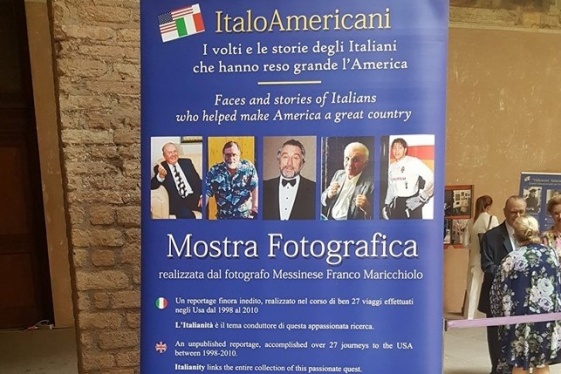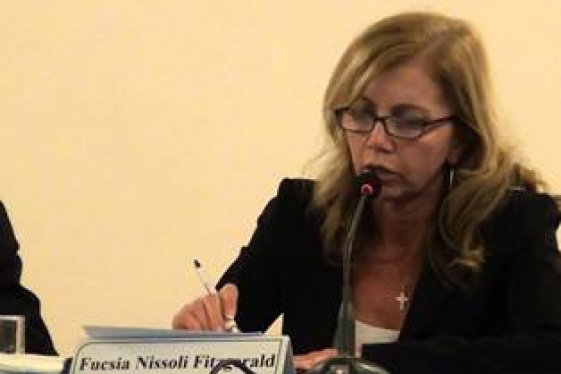

by Fucsia Nissoli
Thank you, Mr. President, Mr. Undersecretary and honorable colleagues. Today is a good day because we are finally discussing the issue of citizenship within this haul, a difficult issue but one that cannot wait. The idea of citizenship expresses within itself the notion and desire that all people are equal, it is a topic that deeply touches the human soul as it provides one with a sense of belonging to a specific community.
What we are considering, then, is a needed reform as it relates to those foreign minors who already experience a sense of belonging to this community, but at the same time this reform is a defeat for all those who were excluded from consideration, namely those Italians who after moving abroad lost their Italian citizenship but still to this day have preserved their Italian identity both in their hearts and in their way of life. Their Italian identity is fully alive and they are asking that it also be recognized on a juridical level.
Italy is a country that has experienced in its history strong periods of emigration even up until the nineties. So we have all witnessed the fact, that our country, a country of emigration, has become over time a country of immigration, to the point that we now have an equal number of emigrants and immigrants. We are dealing therefore with two sides of the same coin in the overall global context of human movement at the center of which is the idea of citizenship as belonging to a community, a citizenship that can be multiple.
Today we have taken the first steps in addressing our country's new demographics, but we cannot yet speak of a finished reform. This reform will not be completed until it includes Italians who lost their citizenship moving abroad. In this way we will have the opportunity to unite two different realities that can make Italy great, that of the new Italians and that of the Italians living abroad. Today, conserving our Ius Sanguinis we open the doors to a Ius Soli Temperato which will allow those born in Italy to parents who have had legal residency for at least five years to obtain Italian citizenship. Moreover it also introduces the possibility of a Ius Culturae provision for granting citizenship to children of foreign parents who came to Italy before their thirteenth birthday and have completed at least five years of schooling in Italy. It is an urgent measure aimed towards minors because children are a priority, but we must not forget to work on the same level to define the rights of each person so that they can once again feel the pride of being fully Italian. We are talking about a pathway that cannot overlook the importance of civil awareness which must be born in the first place by attendance in school from one's early years. Only then will we be able to give rise to a new civil ethos which Italy desperately needs for its future generations.
So my colleagues, Mr. Undersecretary, let us please work with a spirit of farsightedness and not forget about those Italians living abroad who have always truly loved Italy. I ask you to keep in mind the other Italy, to consider the hopes and expectations of those who lost their citizenship but look to this government and to this nation that is known for its openness and has demonstrated its appreciation for the contribution of those Italians living abroad who are a precious resource for our country. I am not talking about just reminiscing on he past but of making a leap into our future.
In fact in our day and age which is characterized by a dramatic increase in human movement, one often does not live in the country of their birth, even if one still profoundly feels a sense of connection to it. Globalization, as it unfolds, is a process that will continue to grow the demand for multiple citizenships. This is true for the Italians who now travel abroad as it was true for those who left their native lands years ago and who lost their Italian citizenship but never lost their love for the motherland.
My proposed law was meant to be a response to the needs of these people. It was not possible to insert my bill into the final text but I ask you now in this session to make a serious commitment to allow those who lost their Italian citizenship after moving abroad a means to reacquire it. I want to thank all 317 of my colleagues who signed my proposed bill and in doing so demonstrated a deep awareness of the seriousness of this matter and I ask you all to now be consistent as is demanded of us by the many Italian voices who the law does not recognize as citizens.
I desire to be the voice of those witnesses and thus I will read some of them to you.
From Canada: "When I learned that I had lost my Italian citizenship, it was a slap in the face to me after having worked for Italy and served in the army. I never would have expected that an Italian could loose his citizenship without any warning."
Another testimony from Brooklyn, NY: "We Italians who live abroad but were born in Italy are Italian and there should be no discussion about our citizenship. We have become citizens of our host country for the sake of inclusion and rights. An Italian born in Italy is a citizen for life and should only need to show that citizenship by going to the consulate and filling out a form to once again have an Italian passport."
From Westport, America: "I was born in Rome on June 26, 1948. I married an American and came to America in 1969. In 1974 my mother found herself living on her own and the only way I could bring her to come and live with me was to first become an American citizen and renounce my Italian citizenship." My father, Liomi, worked his entire life for the Italian government. I want so much to restore my Italian citizenship seeing that I was born and raised there and all my family still lives there. Thank you."
From Washington DC: "I have three sons, two of them and I have reacquired our Italian citizenship, but one of my sons, having been born after I lost citizenship and had still not reacquired it, would like to be Italian like the rest of us. He could obtain Italian citizenship by moving to Italy but he cannot leave his family and work behind. We are asking for a better simpler method so the whole family can be reunited. "
From Mexico: "I know Italians in Mexico who for work reasons had to renounce their Italian citizenship in the past. However I believe that one is always an Italian and that as such they should have the right to keep their Italian passport. "
From Maryland: "There is a basic injustice here: because only Italians who naturalized before 1992 lost their Italian citizenship? Such a law is discriminating. Professor Dulbecco, for this reason, could not get the Nobel Prize for research as an Italian, but only as an American, because the Italian government did nothing to abolish the above mentioned impractical law, discriminating against those who despite being emigrants, are still an invaluable resource for the promotion of the Italian spirit in the world. "
From California: "I know Americans whose grandparents were Italian and they, for one, are able to have Italian citizenship. Not only them, but also their spouses and children. I find it absurd that Italians, who lost their citizenship in the nineties, cannot get it back, unless they return to live in Italy for a year. "
Venezuela: "I am the daughter of Italian parents, born in Salerno, and lived there up until I was 10 years old. I lost my Italian citizenship because the company where I was employed required that I have Venezuelan citizenship in order to continue working there. I want to regain my Italian citizenship because I and all my family are Italian by birth and in our heart.
From Ohio: "This only seems right to me and it can also help the economy, given that so many of our products made in Italy are loved all over the world, thanks to many Italian emigrants, who have brought and still bring with them today our Italian culture out into the world, creating in others a desire to learn more about the Italy that they discovered in the Italians living abroad."
From New York: "Let's not forget those who were forced to leave Italy in order to find a better future."
From Michigan: "I was born in Italy and came to the US when I was five. I lost my Italian citizenship as a child, when my parents became US citizens. Now I return often to Italy. I own property there and would like to be able to say I am also an Italian citizen. I was not just born there. Please, do everything possible for this to become reality. Just laws do not have any political color. I was born in Italy, I grew up there and went to school there and Italy is my homeland. "
California: "I was born in Italy of Italian parents. I speak Italian. I studied in Italy until graduation. My whole family is Italian and lives in Italy. I lost my Italian citizenship after I moved to the US and would like to regain it. " "It should not be otherwise once born in Italy, and having completed military service then one is always Italian."
Brooklyn: "I was born, lived, educated, and even drafted there but left because I was without work. So how come I can no longer call Italy my country? ". "Italian citizenship can not be erased by the life events that led many Italians to emigrate. For Italians abroad the reacquisition of Italian citizenship means ratifying something that is already in our DNA. Today, once ratified this bill, Parliament and the Italian people restore their due honor.
Mexico: "I'm married to a Mexican and in order to work I asked to become a citizen of my host country and then when I regained my Italian citizenship I could only pass in on to my minor daughter. The adult daughter, according to the 1992 law, has no right which is the most absurd thing. Both of them are my daughters. I was born in Italy, I studied in Italy. My parents, grandparents, great grandparents, great great grandparents and ancestors are all Italian ... my Grandparents and dad fought in the First and Second World War. They were injured and fought for a homeland that is now denied us and I can not explain why people of Italian extraction can claim Italian citizenship from an ancestor who arrived in Mexico in 1880 but my daughter born in 1973 can not. "
Trumbull, Connecticut: "In 1976 I and my family emigrated to the United States. In 1986 approximately I am became an American citizen. I had no intention of losing the citizenship of my country of birth. It's a shame that I lost my Italian citizenship. I would buy it back. " "It is crazy to give Italian citizenship to anyone who has a distant grandfather from Italy but remove those who were born and raised in Italy and still speak Italian." "I have four children: three are Italian citizens and one is not." "I was born and graduated in Italy. Why is it so hard to reclaim a nationality once lost in this globalized world? ". "I was born in Italy and lived in Italy until I was twenty years old. I did all my school there. Then I came to Venezuela for work, and to regain my Italian citizenship they made me suffer and spend so much money because I had to stay in Italy for nearly two years. " "I believe that citizenship is a right that you should not take away because of some bureaucratic loopholes, often due to backwards thinking and inadequacies in the laws."
"My parents would like to restore their Italian citizenship and pass on that right to two of their children who were born after they became Canadian citizens. Out of their three children, only one was able to obtain Italian citizenship, since his mother was still Italian at the time of his birth. It is not fair that the other two children born to her were denied the same right. "
I, however, when I got married did not have to renounce my Italian citizenship to become American. Otherwise I could have been one of those stories that I have just read. So, I think that we cannot fail to do something about this matter. We owe a debt of gratitude to those People who were born in Italy but later lost their italian citizenship yet continue to preserve love for Italy in their hearts.
(And at this point the hall erupts in claps of approval)
You may be interested
-
“Associazionismo e Italiani nel mondo: rappor...
"Associazionismo e italiani nel mondo: rapporti e prospettive" è il tema del convegno che...
-
“Italoamericani: Ambasciatori di Italianità”:...
“Italoamericani: Ambasciatori di Italianità” – I volti e le storie degli italiani che hann...
-
«Il sistema Italia è nel mondo, governo svegl...
Gli effetti dell’emergenza Covid-19 non stanno risparmiando nessuno. Adesso l’Italia tenta...
-
«L’Italia all’estero motore per lo sviluppo d...
Fucsia Nissoli, consigliere della Fondazione Italia USA, rappresenta alla Camera dei Deput...
-
A historic day: the Italian Parliament passes...
Today the House of Representatives of the Italian Parliament almost unanimously approved t...
-
Accolto dal Governo un Odg della deputata Fuc...
Oggi, nell'ambito del dibattito sugli ordini del giorno sulla "Conversione in legge del de...
-
Accolto ODG Nissoli per costituire un tavolo...
L'on. Fucsia Nissoli, in occasione della conversione in legge, a Montecitorio, "del decret...
-
Accordo di sicurezza sociale Italia-USA: Niss...
Deputata di Forza Italia eletta in Centro e Nord America, Fucsia Nissoli , nell’ambito del...










